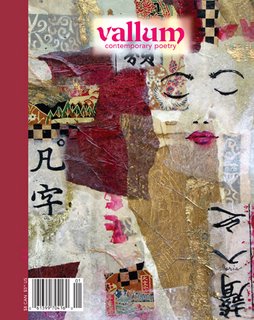 Vallum (Contemporary Poetry magazine) from Montreal, Canada, and edited by poets Joshua Auerbach and Eleni Zisimatos Auerbach, has become one of the best-looking, and best-edited, journals of its kind (bi-annual, glossy, international) of late, with support from the Canada Council for the Arts.
Vallum (Contemporary Poetry magazine) from Montreal, Canada, and edited by poets Joshua Auerbach and Eleni Zisimatos Auerbach, has become one of the best-looking, and best-edited, journals of its kind (bi-annual, glossy, international) of late, with support from the Canada Council for the Arts.It is increasingly a venue for poems and reviews by some of the most established and intriguing poets currently writing in English, which is impressive, given its humble origins, and location (Anglophone Montreal has few equivalent surviving ventures, though long-lived Matrix, of course, is the model).
The latest issue, 3:2, as well as featuring new Japanese poetry, also presents new poems by Fanny Howe, George Elliott Clarke, John Barton, Heather Spears, Ross Leckie, Franz Wright, and yes, even myself.
Horn-tooting warning...
My two latest collections also get reviewed, by the American poet Kimberly Burwick, who says: "Were a director like Jean-Luc Godard to direct a feature-length film from a collection of poems, Cafe Alibi would be the perfect choice. Moody, sophisticated, and vigilantly flirtatious, Swift's poems use language to bring the gaze to the place just beyond the reel."
To order a copy today: www.vallummag.com
Comments